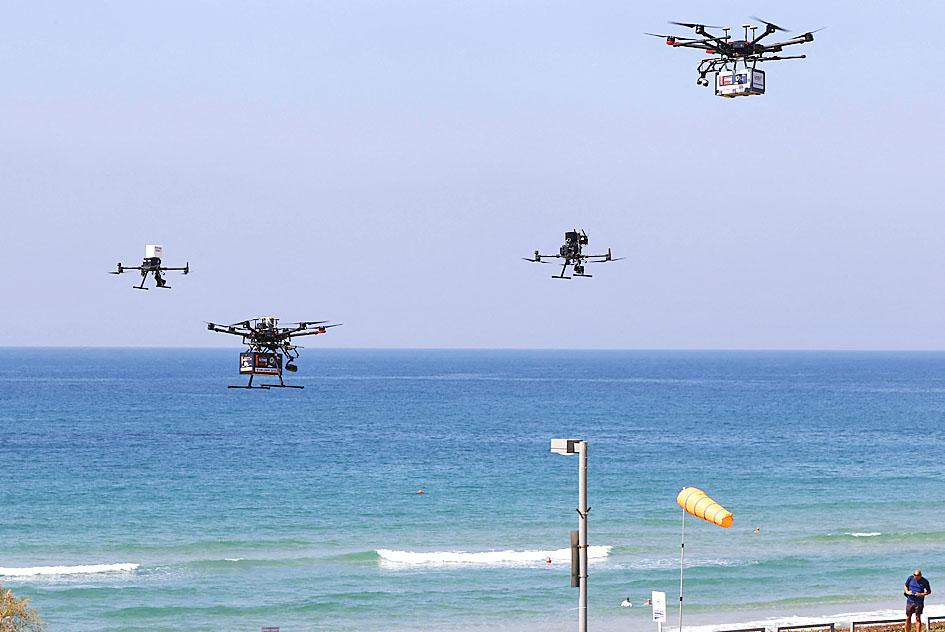Drone powerhouse Israel is translating the know-how of air force veterans to the delivery of sushi and ice cream, as companies tap their expertise to avoid collisions in increasingly crowded skies.
On a grassy stretch of a Tel Aviv beachfront, three drones flew above shiny high-rises this week, propellers buzzing as they lowered down onto landing pads.
Two carried sushi and a third hauled cans of beer.

Photo: AFP
Their flight was made possible by High Lander, an Israeli company that specializes in traffic control for autonomous drones, and Cando, which helps craft drone strategies for clients.
“To fly one drone is not an issue,” High Lander chief executive Alon Abelson told reporters. “We are talking about multi drones ... coming from different drone manufacturers, but still they are monitoring with our software and we can make sure they don’t collide.”
The demonstration was part of a 20 million shekel (US$6.2 million) public-private initiative to advance Israel’s drone technology.
Daniella Partem, who leads the drone initiative at the Israel Innovation Authority, said she envisioned “thousands” of drones flying simultaneously in crowded cities in the future, providing medical deliveries, bolstering police missions and speeding up takeout food.
“Our goal is to create a competitive market in Israel, not dominated by one company,” she said. “If we manage to remove vehicles from the roads to the air, we can affect traffic, we can reduce air pollution ... we can create a better, safer environment for the delivery of goods.”
Drone expert Michael Horowitz, a political scientist at the University of Pennsylvania, said Israel was crafting “civilian analogues” to its military drones that are getting smaller, and can reportedly move and strike in coordination.
Israel’s military drone program has faced criticism, especially from Palestinians in the blockaded Gaza Strip, who say it induces fear and can lead to the harming of civilians.
In the commercial drone industry, Horowitz said Israel could offer a new approach to companies that tend to develop their technologies alone.
“Often you’ll have a company like Google that is operating oversight of its own systems only,” Horowitz said. “If an Israeli company develops an effective local-level drone command and control architecture that can include drones of lots of different companies, I could imagine a lot of people potentially interested in that product.”
Horowitz said the advances in civilian drones could help Israel recapture drone market share as rivals China and Turkey eat into its military drone exports.
Abelson said he had clients around the world, including in Japan, South Korea, France, the US, Israel and African countries.
Manoel Coelho, chief executive officer of Brazil’s Speedbird Aero drone company, told reporters that he used High Lander to “deconflict airspace,” because it was “one of the first in the world to do it in such an organized manner”
Other Israeli work with drones remains theoretical.
Hadas Aharoni, 22, a controller with the Airwayz drone company, monitored dozens of autonomous drones flying in the northern city of Hadera, although she sat in a control room over Tel Aviv’s busy Ayalon highway, about 50km to the south.
“We can see the flight paths where the drones take off and land, their heights, their batteries and all sorts of problems that we need to resolve so that the drones arrive as they should,” Aharoni said.
So far, the drones have been running practice missions to set landing pads in the city.
“When in the future there will be more flight programs, we are checking this system will be stable,” she said.

Hong Kong authorities ramped up sales of the local dollar as the greenback’s slide threatened the foreign-exchange peg. The Hong Kong Monetary Authority (HKMA) sold a record HK$60.5 billion (US$7.8 billion) of the city’s currency, according to an alert sent on its Bloomberg page yesterday in Asia, after it tested the upper end of its trading band. That added to the HK$56.1 billion of sales versus the greenback since Friday. The rapid intervention signals efforts from the city’s authorities to limit the local currency’s moves within its HK$7.75 to HK$7.85 per US dollar trading band. Heavy sales of the local dollar by

To many, Tatu City on the outskirts of Nairobi looks like a success. The first city entirely built by a private company to be operational in east Africa, with about 25,000 people living and working there, it accounts for about two-thirds of all foreign investment in Kenya. Its low-tax status has attracted more than 100 businesses including Heineken, coffee brand Dormans, and the biggest call-center and cold-chain transport firms in the region. However, to some local politicians, Tatu City has looked more like a target for extortion. A parade of governors have demanded land worth millions of dollars in exchange

Taiwan Semiconductor Manufacturing Co’s (TSMC, 台積電) revenue jumped 48 percent last month, underscoring how electronics firms scrambled to acquire essential components before global tariffs took effect. The main chipmaker for Apple Inc and Nvidia Corp reported monthly sales of NT$349.6 billion (US$11.6 billion). That compares with the average analysts’ estimate for a 38 percent rise in second-quarter revenue. US President Donald Trump’s trade war is prompting economists to retool GDP forecasts worldwide, casting doubt over the outlook for everything from iPhone demand to computing and datacenter construction. However, TSMC — a barometer for global tech spending given its central role in the

The Financial Supervisory Commission (FSC) yesterday met with some of the nation’s largest insurance companies as a skyrocketing New Taiwan dollar piles pressure on their hundreds of billions of dollars in US bond investments. The commission has asked some life insurance firms, among the biggest Asian holders of US debt, to discuss how the rapidly strengthening NT dollar has impacted their operations, people familiar with the matter said. The meeting took place as the NT dollar jumped as much as 5 percent yesterday, its biggest intraday gain in more than three decades. The local currency surged as exporters rushed to